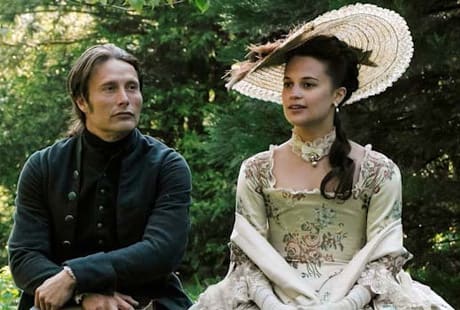Eschewing the litany of philosophical rationalizations and explanations for the Age of Enlightenment, Nikolaj Arcel's straightforward biopic about Denmark's late 18th Century ideological shift, A Royal Affair suggests mainly that it was a process of secularization overthrowing theology's antiquated hegemony.
Moreover, what Nikolaj Arcel's impeccably framed melding of emotion and politics depicts is how radical enlightenment proved problematic during the reign of Christian VII (Mikkel Følsgaard).
Known for being affable, but unstable and incredibly inconsistent (read: possibly schizophrenic), Christian's time as King was mostly artifice. Married to British cousin Caroline Mathilde (Alicia Vikander) to keep up appearances and fulfill obligations, he was more interested in watching plays and fornicating with the help than performing a patriarchal role, leaving decisions to an existing committee.
Where Affair finds its drama is in the experience of Caroline as a young girl thrust into a miserable marriage. Sticking mostly to raising their first son, Frederick, her passion is later inspired by her husband's personal physician, Johann Friedrich Struensee (Mads Mikkelsen), whose underground, radical political views eventually influence the King, with whom he has formed an intense, albeit calculated bond.
Amidst the stunning cinematography, intricate set design and mature framing, the overriding theme of cultural enlightenment as a mode of freedom from subjugation mirrors Caroline's dangerous sexual awakening with her husband's best friend and ally.
As Johann gradually manipulates the King into giving him increased political influence, dramatically changing Denmark, much to the simultaneous delight and confusion of its denizens, their indulgence spirals increasingly out of control.
As much a championing and reminder of the importance of modern freedoms as it is an admonitory for the dangers of tempestuousness and impatience in the game of political change, this clever drama works more so in technical and theoretic terms than emotionally.
While each character demonstrates increasingly flexible morality, ultimately making the erratic and initially aggravating Christian the victim of this film, the surface story of repressed passion actualized wanes, leaving the outcome more informative than cathartic or tragic.
Still, few biopics manage to blend historical accuracy with cinematic cohesion as effectively as this clever treatise on the dangers of overstepping your boundaries.
(Mongrel Media)Moreover, what Nikolaj Arcel's impeccably framed melding of emotion and politics depicts is how radical enlightenment proved problematic during the reign of Christian VII (Mikkel Følsgaard).
Known for being affable, but unstable and incredibly inconsistent (read: possibly schizophrenic), Christian's time as King was mostly artifice. Married to British cousin Caroline Mathilde (Alicia Vikander) to keep up appearances and fulfill obligations, he was more interested in watching plays and fornicating with the help than performing a patriarchal role, leaving decisions to an existing committee.
Where Affair finds its drama is in the experience of Caroline as a young girl thrust into a miserable marriage. Sticking mostly to raising their first son, Frederick, her passion is later inspired by her husband's personal physician, Johann Friedrich Struensee (Mads Mikkelsen), whose underground, radical political views eventually influence the King, with whom he has formed an intense, albeit calculated bond.
Amidst the stunning cinematography, intricate set design and mature framing, the overriding theme of cultural enlightenment as a mode of freedom from subjugation mirrors Caroline's dangerous sexual awakening with her husband's best friend and ally.
As Johann gradually manipulates the King into giving him increased political influence, dramatically changing Denmark, much to the simultaneous delight and confusion of its denizens, their indulgence spirals increasingly out of control.
As much a championing and reminder of the importance of modern freedoms as it is an admonitory for the dangers of tempestuousness and impatience in the game of political change, this clever drama works more so in technical and theoretic terms than emotionally.
While each character demonstrates increasingly flexible morality, ultimately making the erratic and initially aggravating Christian the victim of this film, the surface story of repressed passion actualized wanes, leaving the outcome more informative than cathartic or tragic.
Still, few biopics manage to blend historical accuracy with cinematic cohesion as effectively as this clever treatise on the dangers of overstepping your boundaries.
